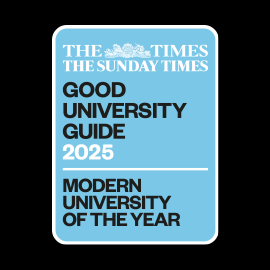-
Study
-
Undergraduate
- UCAS Clearing & Confirmation 2025
- Application Guides
- UCAS Exhibitions
- Foundation Years
- School & College Outreach
- Information for Parents
-
Postgraduate
- Application Guide
- Postgraduate Research Degrees
- Flexible Learning
- Change Direction
- Register your Interest
-
Student Life
- Students' Union
- The Hub - Student Blog
- Accommodation
- Northumbria Sport
- Support for Students
-
Learning Experience
- Real-World Learning
- Research-enriched learning
- Graduate Futures
- The Business Clinic
- Study Abroad
-
-
International
International
Northumbria’s global footprint touches every continent across the world, through our global partnerships across 17 institutions in 10 countries, to our 277,000 strong alumni community and 150 recruitment partners – we prepare our students for the challenges of tomorrow. Discover more about how to join Northumbria’s global family or our partnerships.
View our Global Footprint-
Quick Links
- Course Search
- Undergraduate Study
- Postgraduate Study
- Information for Parents
- London Campus
- Northumbria Pathway
- Cost of Living
- Sign up for Information
-
International Students
- Information for International Students
- International Events
- Application Guide
- Entry Requirements and Education Country Agents
- Global Offices
- English Requirements
- English Language Centre
- International student support
- Cost of Living
-
International Fees and Funding
- International Undergraduate Fees
- International Undergraduate Funding
- International Masters Fees
- International Masters Funding
- International Postgraduate Research Fees
- International Postgraduate Research Funding
-
International Partners
- Agent and Representatives Network
- Global Partnerships
- Global Community
-
International Mobility
- Study Abroad
- Information for Incoming Exchange Students
-
-
Business
Business
The world is changing faster than ever before. The future is there to be won by organisations who find ways to turn today's possibilities into tomorrows competitive edge. In a connected world, collaboration can be the key to success.
More on our Business Services -
Research
Research
Northumbria is a research-rich, business-focused, professional university with a global reputation for academic quality. We conduct ground-breaking research that is responsive to the science & technology, health & well being, economic and social and arts & cultural needs for the communities
Discover more about our Research-
Quick Links
- Research Peaks of Excellence
- Academic Departments
- Research Staff
- Postgraduate Research Studentships
- Research Events
-
Research at Northumbria
- Interdisciplinary Research Themes
- Research Impact
- REF
- Partners and Collaborators
-
Support for Researchers
- Research and Innovation Services Staff
- Researcher Development and Training
- Ethics, Integrity, and Trusted Research
- University Library
- Vice Chancellors Fellows
-
Research Degrees
- Postgraduate Research Overview
- Doctoral Training Partnerships and Centres
- Academic Departments
-
Research Culture
- Research Culture
- Research Culture Action Plan
- Concordats and Commitments
-
-
About Us
-
About Northumbria
- Our Strategy
- Our Staff
- Our Schools
- Place and Partnerships
- Leadership & Governance
- University Services
- History of Northumbria
- Contact us
- Online Shop
-
-
Alumni
Alumni
Northumbria University is renowned for the calibre of its business-ready graduates. Our alumni network has over 250,000 graduates based in 178 countries worldwide in a range of sectors, our alumni are making a real impact on the world.
Our Alumni - Work For Us
What will I learn on this module?
You will consolidate and build upon your learning of social work knowledge to develop the specialist knowledge and skills for effective research informed practice with adults and children, young people, their families and carers. You will be encouraged to integrate theoretical perspectives and research into the design and implementation of effective social work interventions, particularly in the contexts of complex needs, risk, professional judgement and decision making. You will apply the concept of safeguarding across the lifespan to develop an understanding of the interplay between relevant legislative and policy frameworks, including specific reflection on ‘lessons from practice’ and the development of decision making frameworks and inter-professional working practices.
How will I learn on this module?
You will learn by building on your initial academic and practice learning to inform and promote your critical understanding and analysis of statutory social work roles and relationships with service users and carers. Lead lectures, seminars and simulated group learning activities will provide you with opportunities for critical reflection of contemporary social work practice in statutory contexts. Your seminar activities will be student led using the following approaches: directed reading and critical analysis of international and national research, integrating the perspective of service users and carers into professional practice, supporting the involvement of frontline practitioners on relevant topics and extensive use of the e-learning portal. You will draw on Safeguarding Practice Reviews to identify and analyse the issues encountered in front line practice when services have failed vulnerable individuals. People who use services will be involved both directly and indirectly in your learning and teaching experiences. You will be offered formative feedback from your peers and seminar leaders during seminar sessions.
How will I be supported academically on this module?
The module begins with an introduction to the module exploring the aims, learning outcomes and academic requirements of the module and what is required for a successful outcome. Lectures and seminars are the key means of offering academic support to you as well as providing a reflective space to examine the complexities of social work practice. These sessions will also enable you to develop confidence to engage in discussion including constructive critique of your own and others work in a safe environment helping you identify your strengths and areas for development.
Feedback and feedforward to guide future work will be provided through group work throughout the module and academic feedback on assessed work. General queries about the module will be addressed by the module leader. Contact details for all tutors for this module are available in the module handbook and via the Electronic Learning Portal (eLP). You will have access to lecturers at teaching times, by email, and telephone.
What will I be expected to read on this module?
All modules at Northumbria include a range of reading materials that students are expected to engage with. Online reading lists (provided after enrolment) give you access to your reading material for your modules. The Library works in partnership with your module tutors to ensure you have access to the material that you need.
What will I be expected to achieve?
Knowledge & Understanding:
LO.1. Critically evaluate concepts, theories and knowledge involving effective social work roles, responsibilities and interventions with children and adults while analysing complex issues of risk assessment and management, safeguarding and individual rights.
LO.2. Critically appraise evidence based research on professional judgements and decision making in relation to current statutory and policy requirements.
Intellectual / Professional skills & abilities:
LO.3. Work well with others, while communicating effectively in both written and verbal form
Personal Values Attributes (Global / Cultural awareness, Ethics, Curiosity) (PVA):
LO.4. Demonstrate a sophisticated understanding of user and/or carer perspectives in relation to social work processes
LO.5. Articulate a critical understanding of social work values of choice, independence and wellbeing, and use this to inform effective social work practice
How will I be assessed?
A key principle of the assessment strategy is your engagement and participation in structured tasks based upon a developing case study. The learning opportunities provided in formative and summative assessment tasks will enable you to further develop skills in presenting information in a succinct and analytical manner, attributes which will be of benefit in pre and post qualifying social work practice.
Each element of the summative assignment contributes 50% of the mark and you must pass both elements of the summative assessment task in order to successfully complete the module.
Part 1: you will work as a small group to develop and deliver a presentation based on the identification of risk in the case study material (MLO’s 1,2, 3, 4 and 5). To support you in preparing for the group presentation task you will work in groups to develop and present a formative assessment task based upon a critical overview and analysis of an emergent theme from Serious Case Review findings.
Part 2: you will complete an individual 2,500 word written assignment based on effective risk management and effective safety planning in the further developed case study ( MLO’s 1, 2, 3, 4 and 5).
Pre-requisite(s)
SW0741, SW0742, SW0743
Co-requisite(s)
Module abstract
This module will support you to move from an understanding of the knowledge frameworks that underpin professional practice to professional capability in relation to working with more complex issues and conflicting values at a level at which you will be eligible to register with Social Work England (SWE) as a qualified social worker. The learning opportunities provided in the module will equip you to develop knowledge of SWE professional standards and demonstrate evidence against the Knowledge and Skills Statements for child and family social work and social work with adults including the social work role in organisational contexts, safeguarding, analysis , decision making, planning and review, effective assessments and outcome based interventions, person centred approaches, professional ethics and leadership and supervision and critical reflection. This will be achieved by developing your ability to recognise the facilitators and constraints of effective decision making when intervening with service users with complex needs. You will consider the role of power and authority in fulfilling statutory social work roles and you will critically explore strategies that seek to promote individual’s right to self-determination in statutory interventions.
Course info
Credits 20
Level of Study Postgraduate
Mode of Study 2 years Full Time
Department Social Work, Education and Community Wellbeing
Location Coach Lane Campus, Northumbria University
City Newcastle
All information is accurate at the time of sharing.
Full time Courses are primarily delivered via on-campus face to face learning but could include elements of online learning. Most courses run as planned and as promoted on our website and via our marketing materials, but if there are any substantial changes (as determined by the Competition and Markets Authority) to a course or there is the potential that course may be withdrawn, we will notify all affected applicants as soon as possible with advice and guidance regarding their options. It is also important to be aware that optional modules listed on course pages may be subject to change depending on uptake numbers each year.
Contact time is subject to increase or decrease in line with possible restrictions imposed by the government or the University in the interest of maintaining the health and safety and wellbeing of students, staff, and visitors if this is deemed necessary in future.
Useful Links
Find out about our distinctive approach at
www.northumbria.ac.uk/exp
Admissions Terms and Conditions
northumbria.ac.uk/terms
Fees and Funding
northumbria.ac.uk/fees
Admissions Policy
northumbria.ac.uk/adpolicy
Admissions Complaints Policy
northumbria.ac.uk/complaints









